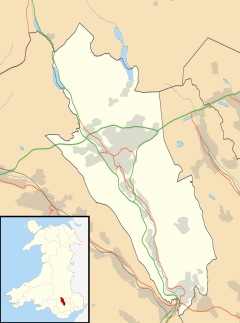Pentre-bach
Pentrebach
|
|
|---|---|
 |
|
| Pentrebach shown within Merthyr Tydfil | |
| Community | |
| Principal area | |
| Ceremonial county | |
| Country | Wales |
| Sovereign state | United Kingdom |
| Post town | Merthyr Tydfil |
| Postcode district | CF48 |
| Dialling code | 01443 |
| Police | South Wales |
| Fire | South Wales |
| Ambulance | Welsh |
| EU Parliament | Wales |
| UK Parliament | |
| Welsh Assembly | |
Pentrebach (Welsh pronunciation: [ˌpɛntrɛˈbɑːχ], sometimes written Pentre-Bach, literally: small village) is a village in Merthyr Tydfil County Borough, Wales. It lies on the east side of the River Taff opposite Abercanaid, south of Merthyr and north of Troedyrhiw. To the east of the village lies the Mynydd Cilfach-yr-Encil which rises up to 445 metres (1,460 ft).
Pentrebach is part of the Plymouth electoral ward which covers Pentrebach, Abercanaid and Troedyrhiw. The village was founded at the time that John Guest built the Plymouth Ironworks in 1763. The name Guest became part of the Guest, Keen and Nettelfold company (GKN). In 1818 Anthony Hill took over ownership of the business. His House was later used as an old people's home, and today has been converted into a Brewers Fayre Restaurant with a Premier Inn attached.
The original Merthyr Tramroad, built in 1802, ran alongside the site of the modern day village, on its way from Pennydarren to Abercynon, though very little of the village had been built at that time. A tunnel still exists, which can be visited on the Merthyr Road. Locomotives had to tip their chimneys while going though this tunnel due to the tunnel clearance.
Pentrebach has its own railway station. This opened in 1886 on the standard gauge Taff Vale Railway which runs from Cardiff to Merthyr alongside the River Taff. The original purpose of the railway was to carry iron ore to Cardiff Docks.
In 1862, on the south side of the village, The South Duffryn Colliery was opened with two shafts which were 250 metres (820 ft) deep. At the height of the production there were some 1300 men employed there. An opencast mine was also located on the mountainside above the village.
...
Wikipedia

